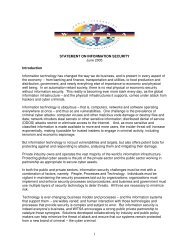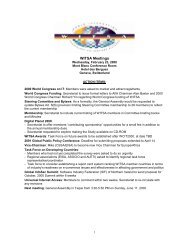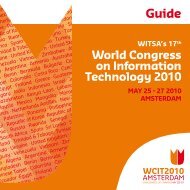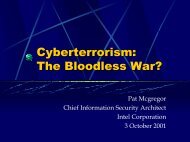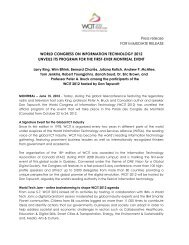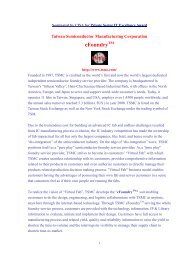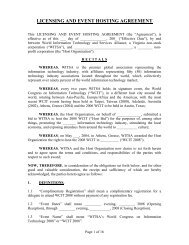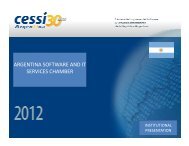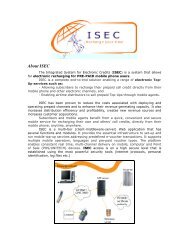Digital Planet - Executive Summary v1 - WITSA
Digital Planet - Executive Summary v1 - WITSA
Digital Planet - Executive Summary v1 - WITSA
- No tags were found...
Create successful ePaper yourself
Turn your PDF publications into a flip-book with our unique Google optimized e-Paper software.
<strong>Digital</strong> <strong>Planet</strong>The Global Information Economy<strong>Executive</strong> <strong>Summary</strong>A Study Presented by the World Information Technology and Services Alliance (<strong>WITSA</strong>)How big is the worldwide Information and CommunicationsTechnology (ICT) market, and how fast is it growing?Which country markets and which specifictechnology segments show the largest net increase in ICTspending and usage? How does spending on ICT affectcompanies, individuals — and beyond that — economies,employment, creation of wealth, and knowledge?Economists, ICT vendors, and policy makers have beentrying to answer these and related questions for years. Thisstudy represents the first truly global analysis of these complexissues. The World Information Technology and ServicesAlliance (<strong>WITSA</strong>) commissioned International DataCorporation (IDC) to compile and analyze statistics thatput the single, most significant technology-based socialtransformation of the late 20th century — the emergenceof the information society — into perspective.To obtain the broadest, most comprehensive view of themarket, IDC studied the ICT industries in each of the 50largest country markets around the globe (as well as four“rest of world” regions), representing 98% of the world’sspending on ICT and 97% of the world’s aggregate GrossDomestic Product (GDP). The study also evaluated severalsocial variables to measure the impact of ICT beyond businessand into schools, homes, and everyday lives. The datawere gathered and evaluated using consistent methodologiesand definitions.The answers are clear. Spending on information and communicationstechnology is a critically important element ofthe worldwide economy. The ICT industry is among themost significant contributors to the overall economichealth of the global economy. The sheer bulk of its contributionis enormous (see Figure 1).• ICT is responsible for $1.8 trillion in spending in1997, approximately 6% of aggregate global GDP.This is greater than the GDP of France and almosttwice the size of the GDP of the state of California.• In 1997, ICT spending was nearly 40% larger than in1992. It is growing 27% faster than the overall worldwideGDP, which has grown by an average of 5.5%annually for the past five years.• The explosion in worldwide ICT cuts across traditionalbarriers — ICT spending has grown in everyeconomy worldwide over the past five years, regardlessof GDP or population growth rates.• During 1992–1997, Asia/Pacific, Latin America, andEastern Europe demonstrated the fastest growing ICTspending markets with 5-year average annual growthrates of 14.5%, 13.6%, and 9.5% respectively.The fact that Microsoft has recently replaced General Electricat the very top of the market capitalization tables (TheWall Street Journal, September 15, 1998) is further proof ofthe prominence of the ICT sector in the global economy.As enormous as these contributions to worldwide economicgrowth and development may seem, the downstreameffects on wealth-building are actually the industry’sgreatest contribution. The simple description of raw size orbarely-bridled growth does not begin to measure the farreachingeffect of ICT throughout society. And it does notaddress a host of far more interesting questions that cut tothe heart of issues important to technologists, managers,sociologists, legislators, and others, including:INTERNATIONAL DATA CORPORATION 1998 Page 1
Figure 1Worldwide ICT Spending by Segment8007006005004003002001000Telecommunications Spending1992 1993 1994 1995 1996 1997(US $B)2,0001,8001,6001,400Worldwide ICT Spending300250200150100500IT Services Spending1992 1993 1994 1995 1996 1997IT Hardware Spending3503002502001501005001992 1993 1994 1995 1996 19971,2001,00080060040012010080604020Software Spending01992 1993 1994 1995 1996 1997Internal IT Spending3503002502001501005001992 1993 1994 1995 1996 199720001992 1993 1994 1995 1996 1997PeriodOffice EquipmentIT Software SpendingIT Services SpendingInternal SpendingIT Hardware SpendingTelecommunications30252015105Office Equipment Spending01992 1993 1994 1995 1996 1997Note: All amounts are in US$B values.Source: <strong>WITSA</strong>, ITU, International Data Corporation, 1998Does ICT spending growth affect overall economic growth,or vice versa? Does ICT spending create jobs — good,high-paying career opportunities that drive per-capitawealth? Does ICT translate to increased productivity forbusinesses and other organizations? Can ICT really providea level playing field for all citizens anywhere in the world?Several clear patterns emerge from the data. Spending oninformation and communications technology is a key accelerator,catalyst, and multiplier of a wide variety of social andeconomic measures. It drives company growth and jobgrowth. It increases access to information across geographical(north/south) and economic (rich/poor) boundaries.The Web has the potential to create a level playing field iftwo challenges are addressed: establishing an extensivetelecommunications backbone and satisfying the increaseddemands of the rapidly increasing user base. Analysis of thedata reveals a series of beneficial effects of ICT spending onnational economies and the world economy.• Company Starts. Investments in ICT create newcompanies — a net increase of 90,000 companies inUnited States, Canada, Australia, United Kingdom,Italy, France, Netherlands, Japan, and Sweden since1992. In the United States alone, an average of 7,200new tax-paying and employing ICT companies havebeen added in each of the past five years.• Job creation. Employment in the U.S. “software andservices” segments alone has increased by over 380,000in the past five years. Canada, France, and Finlandhave seen similar expansion with increases of 51,000,7,200, and 1,200 jobs respectively.Page 2<strong>Digital</strong> <strong>Planet</strong> — The Global Information Economy
Figure 2GDP vs. ICT, ICT Company Growth, and Software and Services EmploymentWW GDP(US $T)35302520151050JTrends in Worldwide ICT Spendingvis-à-vis Trends in Worldwide GDP, 1992–1997JJ1992 1993 1994 1995 1996 1997JJJWW ICT Market(US $T)21.81.61.41.210.80.60.40.20WW GDPJ WW ICT MarketTotal Number of ICT Companiesby Country, 1992–1997Software and Computer-Related Services EmploymentInternational Comparisons, 1992–1996350,000United States Canada Japan France Finland300,000250,000200,000150,000199219931994838,334894,256955,09472,02479,02199,056488,469445,662424,867151,347147,881153,32916,20017,00016,500100,00050,00001992 1993 1994 1995 1996 1997199519961,083,9771,223,263123,312N/A407,396N/A158,544N/A17,400N/ASource: <strong>WITSA</strong>, World Bank, OECD, International Data Corporation, 1998• Ripple Effects. ICT increases overall economic productivity,by translating investments into improvedcoordination and communication. Recent worldwideeconomic trends have led highly respected economistsand analysts to suggest that significant increases inICT spending are often associated with subsequentincreases in productivity. However, experts believethat the increases often lag by several years.• Resilience. ICT spending in developed economiesweathers downturns in overall economic activity,helping to flatten out destructive boom/bust cycles.For example, although Japan has been in a recessionfor the past 2–3 years, its ICT/GDP ratio continuesto increase. Recessions in Western European andNorth American countries have not typically resultedin declines in ICT spending.<strong>Digital</strong> <strong>Planet</strong> — The Global Information EconomyPage 3
Figure 3Worldwide PCs Installed in Schools and Homes, Worldwide Internet Hosts(Millions)25Worldwide Internet Hosts(Millions)120PCs Installed in Schools and Homes20100801560104052001992 1993 1994 1995 1996 199701992 1993 1994 1995 1996 1997Source: <strong>WITSA</strong>, ITU, International Data Corporation, 1998The study’s data demonstrate that spending on ICTrebounds quickly in developing economies undergoing transitions.Mexico, for example, was able to recover from the1994 peso crisis quickly and resume its investment in ICT.In keeping with this trend, IDC expects ICT spending inmost Asia/Pacific countries to fully rebound following theeconomic crisis.As overall demand increases with the creation of newwealth in the ICT market, a cycle occurs. Greater productivitycreates new wealth for further investment. The implementationof more advanced IT strategies in businessestakes the cycle to another level, further improving productivity,increasing output, and, by extension, sales, revenues,and profits (see Figure 2).ICT spending favors improvement in global economichealth and eases the inevitable ups and downs of economiccycles by creating companies and jobs, by improvingefficiency and productivity, and by jump-startingeconomic recoveries.Yet, spending on ICT carries another entire set of benefits— this time for individuals. Spending on ICT improvesthe quality of life by easing access to information and promotinga freer exchange of ideas in developing and developedeconomies alike:• Over 118 million PCs are now installed in homes andschools worldwide, over three times the 36 millioninstalled five years previously. Collectively, these PCsform a base comparable to the population of Japan.• More than 50 million people are added to the globalcommunications network every year as a result ofinvestments in telecommunications infrastructures.Thus, the number of people with household connectionsincreased more than 30% since 1992, growing toover 800 million connected individuals in 1997.Page 4<strong>Digital</strong> <strong>Planet</strong> — The Global Information Economy
• Internet growth is exploding everywhere.The availability of Internet hosts hasincreased twenty-fold over 1992 to 25 millionin 1997. In contrast to the print- andbroadcast-dominated past, the proliferationof electronic information access providesincomparable breadth and depth of informationfor rich and poor nations and individualsalike — in many cases, life-enrichinginformation (see Figure 3).The Internet and the availability of affordablecomputing solutions have lowered many of thegeographical boundaries that hindered ICTdevelopment. This is enabling the creation of aglobal market for technology products and services.The last five years have witnessed thebeginning of a shift in the traditionalnorth/south divide separating the “haves” and“have-nots” (see Figure 4).Formerly thought of as “emerging markets,”Brazil and the People’s Republic of China (PRC)now rank among the 10 predominant ICT marketsin the world as of 1997. This demonstratesthat ICT beneficiaries are no longer confined tothe most developed and wealthiest nations inthe world.While the increases in ICT spending are visiblein all countries, the technology focus of these investmentefforts differs from region to region. Advanced markets(United States, Canada, Japan, and many Western Europeancountries) are focusing on maintaining their existingICT infrastructures and increasing efficiency by investingin software and IT services.Emerging markets, on the other hand, are now concentratingtheir efforts on building basic telecommunications andcomputer infrastructure. These markets are now moreinviting to ICT vendors because they have the knowledgeand desire to absorb the vendors’ products.Conclusions(US $B)7006005004003002001000North WesternAmerica EuropeFigure 41997 ICT Spending by RegionJapanICT Market SizeAsiaPacificLatinAmericaMiddleEast/Africa1992-1997 CAGREasternEurope(% CAGR)16%14%12%10%KEYFINDING: The “have-nots” are gaining on the “haves.” Emerging marketsare investing more rapidly in ICT than the larger, more developednations.Source: <strong>WITSA</strong>, International Data Corporation, 1998number of devices used to access the World Wide Web was78 million; by 2002, the number of Web devices willincrease to more than 515 million.Growth of this magnitude is exciting — and challenging.The creation of basic infrastructure for the information age— reliable electrical sources, basic analog telecommunications,a highly literate workforce — remains a dauntingchallenge for many developing countries. Hardware, software,and communication costs are still too high for manyof these nations. Key potential productivity improvementareas such as enhanced telecommunications bandwidth,digital cash, and electronic privacy and security controlsneed further development. Once developed, their deploymentmust be widespread to provide full benefits to all.8%6%4%2%0%The global ICT market is huge and booming. However,the best may be yet to come. IDC forecasts almost 100 millionpeople will be able to access the World Wide Web bythe end of 1998, and 320 million by 2002. In 1997, theWhile the ICT industry alone can drive much of theprogress, governments and other organizations must alsolend a hand to address these critical areas and activelyencourage deployment of ICT. Not surprisingly, then, the<strong>Digital</strong> <strong>Planet</strong> — The Global Information Economy Page 5
implications of this study’s findings should be very clear topolicy makers, managers, and planners:• Invest. ICT investment is highly correlated with economicgrowth, higher education, new company starts,personal productivity, and job creation. Spending onICT will improve a company’s and a country’s abilityto compete in the global market.• Invest now. Nearly every country worldwide is committedto increased spending on ICT. Laggards will beleft behind.• Connect. Networked PCs and online individuals formthe basis for participation in the new economy. Companiesshould maximize their investments in technologyby connecting users to a common ICTinfrastructure and the Internet.• Connect now. Leading countries are accelerating theirinvestments in Internet and communications technologies.Countries that do not continue to match thisrapid pace of investment will rapidly fall behind.• Deregulate. Telecommunications authorities shouldmake the deregulation of local network access andinterconnection a high priority. Competition will allowfor less-expensive access to the global communicationsnetwork, which enables a greater number of individualsto connect and rapidly decreases investment paybacktimes.• Deregulate now. Over-regulation costs jobs andreduces productivity. Unfortunately, the benefits ofderegulation take time. Countries that continue toretain control of ICT competition will encounteradverse effects to their future economies.<strong>Summary</strong> of Project ScopeThis study was commissioned to answer the need for highqualitydata on the global implications of the ICT industry.The <strong>Digital</strong> <strong>Planet</strong> — The Global Information Economystudy conducted by IDC for <strong>WITSA</strong> presents the broadestview of current levels of customer spending on informationtechnology and communications ever assembled.The data were obtained through a variety of means. Theprincipal source was an in-depth vendor supply analysis ofdata collected in all 50 countries via surveys and interviewsdesigned specifically for this project. This analysis alsoincluded review of financial records of major ICT companieslocated throughout the world. These data were thencompared to findings from surveys of IT professionals, endusers, and channel partners performed by telephone andpersonal interviews. Finally, official statistics on GDP, telephoneusage, and jobs were collected from other organizationssuch as the World Bank, InternationalTelecommunications Union (ITU), and Organization ofEconomic Co-operation and Development(OECD). Oncecollected, IDC’s team of analysts synthesized this broadrange of data with their extensive knowledge of the marketplaceto perform an integrated examination of the globalICT market.The broadly used definition of “information technology”(IT) includes analyses of spending by businesses, homes,government, and education on IT hardware (personal computers,servers, networking equipment), software, and ITservices (systems implementation, training, IT consulting,etc.). The European Information Technology Observatory(EITO) and other organizations have added telecommunications(services and hardware) and office equipment totheir definition of ICT.Keeping the EITO definition as a base, <strong>WITSA</strong> added onemore spending category — internal spending. Throughresearch provided by IDC’s Global IT Survey, spending bycompanies on internal resources (i.e., IT employee salaries,capital depreciation of IT equipment, and the internal portionof the IS spending budgets) is quantified and added tothe overall size of the market.For the purposes of this study, ICT is the sum of externaland internal IT spending, plus telecommunications andother office equipment. The social impact of ICT is measuredby looking at the number of personal computers(PCs) networked, the installed base of PCs in homes andschools, percentage of homes with telecommunicationsaccess, and the number of Internet hosts in each country.Finally, an industry of this magnitude has an impact onGDP, new businesses, and employment. This study containscountry-to-country comparisons of the investment ofICT, effects of ICT growth on GDP growth, the numberof industry-related businesses, and the number of peopleemployed by these companies.Page 6<strong>Digital</strong> <strong>Planet</strong> — The Global Information Economy
This study differs from earlier studies for the followingreasons:• Unlike earlier studies, <strong>Digital</strong> <strong>Planet</strong> is global ratherthan regional or local in scope;• The study is based on primary research rather thanestimates;• The work provides actuals rather than estimates of theperformance of the industry for the last 5 years;• <strong>Digital</strong> <strong>Planet</strong> uses consistent definitions for measuringIT, unlike most studies, which use governmentstatistics that have inconsistent definitions acrosscountries;• The study provides measures of the social as well aseconomic impacts of ICT; and• It contains broader and more complete definitions ofICT — including the internal IT labor costs as well assoftware, services, computer equipment, and telecommunications(see Appendix for complete definitions).Why <strong>WITSA</strong>?<strong>WITSA</strong> responded to the need to fill the gap in understandingthe role of information technology in the developmentof the global economy. <strong>WITSA</strong> is uniquely qualifiedto create this study as it is the global organization of companiesthat are creating and delivering information technologyservices. <strong>WITSA</strong> is the consortium of 32 informationtechnology (IT) industry associations from countriesaround the world.Why IDC?International Data Corporation is the information technologyindustry’s most comprehensive resource on worldwideIT markets, trends, products, vendors, and geographies.IDC provides data, analysis, and advisory services to theworld’s leading IT suppliers as well as IS professionals infinance, insurance, entertainment, advertising, consumergoods, and publishing. IDC’s research and opinions arebased on the results of more than 300,000 end-user surveys,in-depth competitive analysis, broad technology coverage,and strategic analysis. IDC is committed toproviding global research with local content through its500 analysts in more than 40 countries worldwide. IDC isa division of International Data Group, the world’s leadingIT media, research, and exposition company.<strong>Digital</strong> <strong>Planet</strong> — The Global Information Economy Page 7
The World Information Technology and Services Alliance (<strong>WITSA</strong>) is a consortium of 32information technology (IT) industry associations from economies around the world. Asthe global voice of the IT industry, <strong>WITSA</strong> is dedicated to:• advocating policies that advance the industry’s growth and development;• facilitating international trade and investment in IT products and services;• strengthening <strong>WITSA</strong>’s national industry associations through the sharing ofknowledge, experience, and critical information;• providing members with a vast network of contacts in nearly every geographicregion of the world; and• hosting the World Congress on IT, the only industry sponsored global IT event.Founded in 1978 and originally known as the World Computing Services IndustryAssociation, <strong>WITSA</strong> has increasingly assumed an active advocacy role in internationalpublic policy issues affecting the creation of a robust global information infrastructure,including:• increasing competition through open markets and regulatory reform;• protecting intellectual property;• reducing tariff and non-tariff trade barriers to IT goods and services; and• safeguarding the viability and continued growth of the Internet and electroniccommerce.For more information on <strong>WITSA</strong>, please send an e-mail request to soneill@itaa.org or goto www.witsa.org.To receive a copy of the full report go to www.witsa.org.Home to many of America’s most successful growth companies, The Nasdaq StockMarket sm is the second largest and fastest growing major stock market in the world.Over 5,000 companies — more than any other stock market — choose to list on theNasdaq, including the majority of information technology companies. Indeed, Nasdaqis home to 92% of all publicly traded software companies and more then 80% of computerand telecommunications firms. These companies are among America’s mostdynamic including Oracle, Dell, Cisco, and Microsoft. Nasdaq began in 1971 with anannual share volume of 2.2 billion. Today, that volume exceeds 100 billion shares.With digital trading capacity of one billion shares per day, The Nasdaq Stock Marketnow accounts for over half of all equities traded everyday in the United States.For more information see www.nasdaq.com.<strong>Digital</strong> Plant — The Global Information Economy
The Information Technology Association of America (ITAA) is the leading tradeassociation of this nation’s information technology industry. ITAA’s 11,000 directand affiliated member companies create and market products and informationservices associated with computers, communications, and data. ITAA sponsors awide range of services, meetings and activities that enhance an IT firm’s ability toremain competitive in the marketplace.Through it’s advocacy efforts, ITAA helps to foster an environment which isconducive to the health, prosperity and competitive nature of the informationtechnology industry and to help its members succeed in delivering the benefits of ITto their customers. With the aid of its four divisions the association represents theIT industry’s interests in issues such as intellectual property protection, governmentprocurement, telecommunications policy, taxation and privacy. The association’sindustry development programs include advocacy on legislative and regulatoryissues, studies and statistics, domestic and international market development andindustry promotion. ITAA also provides extensive opportunities for businessdevelopment and networking. It strives to create an atmosphere for member firmsto seek partnering relationships, joint technology development, marketingarrangements and growing firms an ability to learn about equity financing.ITAA has also established a close working relationship with the Council ofRegional Information Technology Associations (CRITA) which consists of twentyfourregional groups and on the international level with 32 associations locatedaround the world who are affiliated with the World Information Technology andServices Alliance (<strong>WITSA</strong>).For more information see www.itaa.org.Japan Information Services Association (JISA) has 561 regular members and 83associate members. Regular membership comprises leading software developers,information processing and database/VAN service suppliers. Associate membersfrom leading Japanese hardware vendors, bankers, insurers, variousmanufacturers, traders and common carriers etc. support JISA with theircontributions.Members add up to about 10% of the number of companies in the informationservices industry in Japan, account for nearly 50% of staff employed, and havemore than 60% market share.Its mission is to attain sound and steady growth of the information service industrythrough the promotion of the development of information system technology andconsolidation of infrastructure for computerization, and to contribute to theeconomic and social development of Japan through the promotion ofcomputerization.For more information see www.jisa.or.jp.<strong>Digital</strong> <strong>Planet</strong> — The Global Information Economy
Virginia’s Center for Innovative Technology (CIT) exists to stimulate economic growth withinthe Commonwealth by serving its technology-based businesses. Through a variety ofbusiness, technical and financial assistance programs, CIT helps Virginia companies to:• acquire or develop technologies;• turn technologies into products;• bring technology-based products to market; and• get new products into production.CIT has also taken the leadership role in developing five key technology industries:Aerospace and Transportation Technologies, Advanced Manufacturing, Biotechnologyand Biomedical Applications, Electronics and Advanced Materials, Energy andEnvironmental Technologies, and Information Technology and Telecommunications. Inaddition, CIT facilitated the creation of and is busy implementing Virginia’s Blueprint forTechnology-Based Economic Growth, a document outlining recommendations forVirginia’s emergence as a global technology leader.In FY95 through FY97, CIT helped Virginia’s technology-based companies create/retain9,854 jobs and 222 companies, and increased Virginia’s overall competitiveness by$278 million.For more information regarding CIT, contact your local CIT office at 1-800-3-TECHVA,your industry director at (703) 689-3000 or visit our website at www.cit.org.The Fairfax County Economic Development Authority provides a wide array of servicesand information designed to promote Fairfax County, Virginia as a business location fordomestic and international companies. Fairfax County is recognized around the world asone of the leading centers of the information technology industry and is the internationalheadquarters of the World Information Technology and Services Alliance (<strong>WITSA</strong>). TheCounty’s technology companies are on the cutting-edge in the areas of telecommunications,satellite communications, the Internet, software development and systems integration.For more information on Fairfax County, Virginia, please visit our web site atwww.FairfaxCountyEDA.org.<strong>Digital</strong> Plant — The Global Information Economy
European IT Software and Services Association (EISA) federates the majority of thenational professional associations representing the software, system integration andcomputing services industries of Western, Central and Eastern Europe.EISA is supported by 16 European associations representing 1,585 companies of allsizes, employing 600,000 people and generating revenues of 50 billions of euros(US$55 billion).Robert Guillaumot, Chairman and CEO of INFORAMA, Chairman of the internationalCommittee of Syntec-Informatique (France), is the present Chairman of EISA.For more information contact: rguillaumot@inforama.fr.AIDCConsultingCustom Research • Consulting • Marketing ServicesInternational Data Corporation provides analysis, advice and custom consulting to theworld’s leading information technology suppliers as well as the foremost organizationsin banking and finance, insurance, entertainment, advertising, consumer goods,publishing, and government. IDC’s global network of 500 analysts in more than 40countries uses the industry’s most rigorous standards, definitions and methodologies todeliver accurate and authoritative intelligence on global IT trends, markets, products,vendors, pricing and geographies to support the strategic planning, IS management,procurement decisions, business development and marketing requirements of theindustry. More than 300,000 end-user surveys, in depth competitive views, broadtechnology coverage, and high-level analysis make IDC your best IT information source.IDC’s World Wide Web site (http://www.idc.com) contains additional companyinformation and recent news releases, and offers full-text searching of recent research.IDC is a division of International Data Group, the world’s leading IT media, researchand exposition company.For more information go to www.idc.com.<strong>Digital</strong> <strong>Planet</strong> — The Global Information Economy
Sponsored byThe Nasdaq Stock Market, Inc.1735 K Street, NW, Washington, D.C. 20006 USAPhone: 202-496-2500 Fax: 202-496-2696 www.nasdaq.comVirginia’s Center for Innovative Technology2214 Rock Hill Road, Suite 600, Herndon, VA 22170-4200 USAPhone: 703-689-3000 Fax: 703-689-3041 www.cit.orgFairfax County Economic Development Authority8300 Boone Blvd., Suite 450, Vienna, VA 22182 USAPhone: 703-790-0600 Fax: 703-893-1269 www.fairfaxcountyeda.orgInformation Technology Association of America1616 North Fort Myer Drive, Suite 1300, Arlington, VA 22209 USAPhone: 703-522-5055 Fax: 703-525-2279 www.itaa.orgJapan Information Service Industry Association17th Floor, TIME24 Bldg., 2-45 Aomi, Koto-ku, Tokyo 135-73 JapanPhone:+81-3-5500-2610 Fax: +81-3-5500-2630 www.jisa.or.jpEuropean IT Sofware and Services Association3 rue Leon Bonnat, Paris 75016, FrancePhone: +33 14 430 4968 Fax: +33 14 288 2684Research conducted byInternational Data Corporation5 Speen Street, Framingham, MA 01701 USAPhone: 508-872-8200 Fax: 508-935-4015 www.idc.com98152GLOBALPublished byThe World Information Technology and Services Alliance8300 Boone Blvd., Suite 450, Vienna, VA 22182 USAPhone: 703-522-5055 Fax: 703-525-2279 www.witsa.org


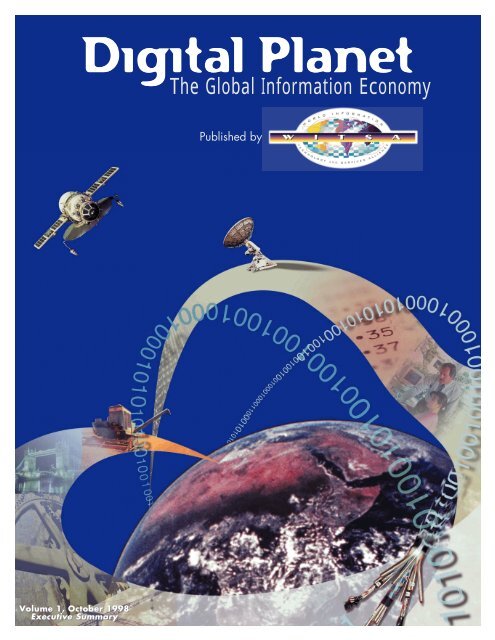
![witsa-[association member] ict excellence awards program](https://img.yumpu.com/51340170/1/190x245/witsa-association-member-ict-excellence-awards-program.jpg?quality=85)
